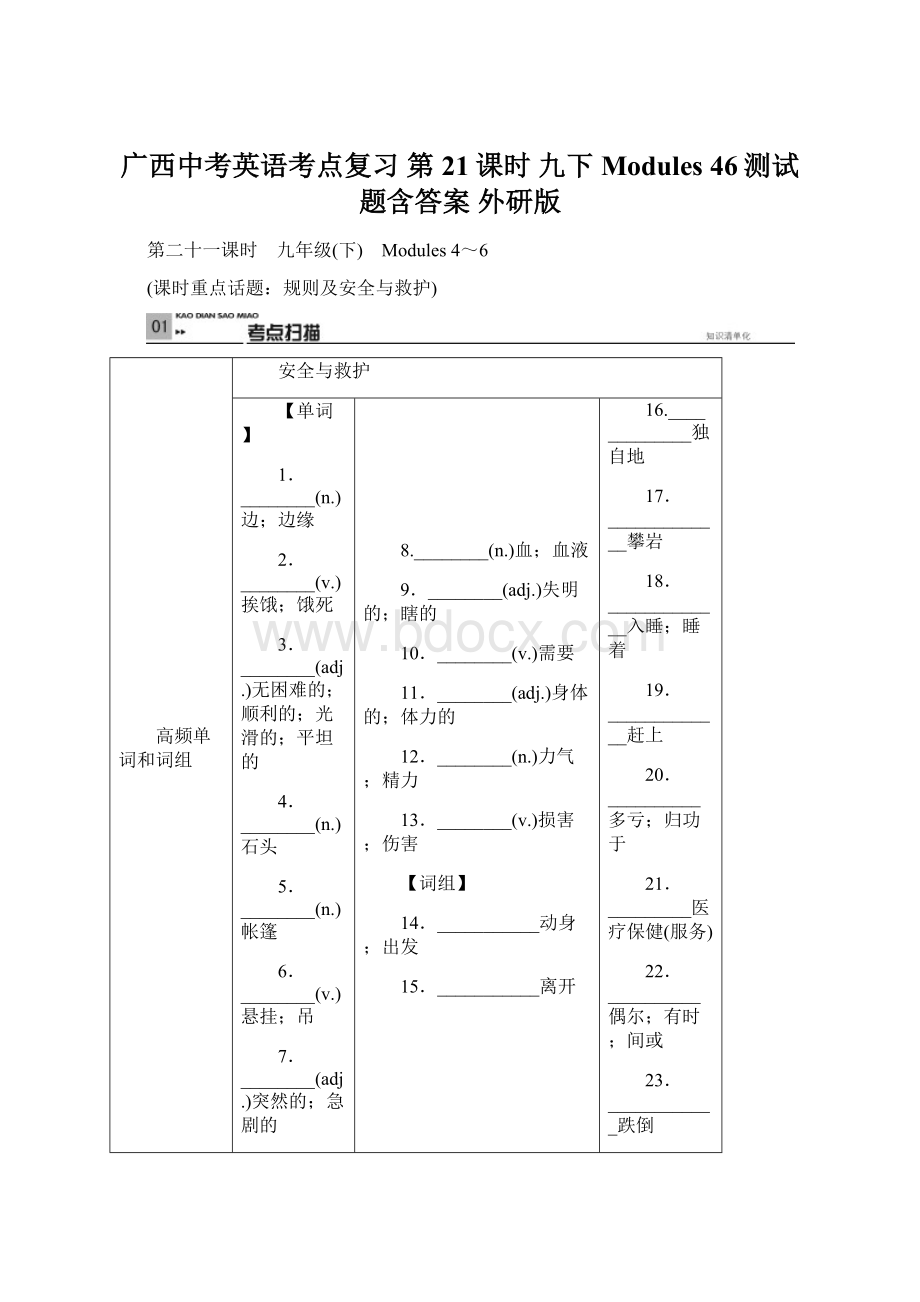广西中考英语考点复习 第21课时 九下 Modules 46测试题含答案 外研版.docx
《广西中考英语考点复习 第21课时 九下 Modules 46测试题含答案 外研版.docx》由会员分享,可在线阅读,更多相关《广西中考英语考点复习 第21课时 九下 Modules 46测试题含答案 外研版.docx(22页珍藏版)》请在冰豆网上搜索。

广西中考英语考点复习第21课时九下Modules46测试题含答案外研版
第二十一课时 九年级(下) Modules4~6
(课时重点话题:
规则及安全与救护)
高频单词和词组
安全与救护
【单词】
1.________(n.)边;边缘
2.________(v.)挨饿;饿死
3.________(adj.)无困难的;顺利的;光滑的;平坦的
4.________(n.)石头
5.________(n.)帐篷
6.________(v.)悬挂;吊
7.________(adj.)突然的;急剧的
8.________(n.)血;血液
9.________(adj.)失明的;瞎的
10.________(v.)需要
11.________(adj.)身体的;体力的
12.________(n.)力气;精力
13.________(v.)损害;伤害
【词组】
14.___________动身;出发
15.___________离开
16._____________独自地
17._____________攀岩
18._____________入睡;睡着
19._____________赶上
20.__________多亏;归功于
21._________医疗保健(服务)
22.__________偶尔;有时;间或
23.____________跌倒
24.__________小心
其他
【单词】
1.________(n.)短袜
2.________(conj.)每当;无论什么时候
3.________(pron.)你自己
4.________(adv.)相当;还算
5.________(adj.)直的;笔直的
6.________(adj.)软的;柔软的
7.________(adj.)静止的;不动的
8.________(n.)意见一致;同意
9.________(n.)(小)树林;林地
10.________(v.)预料;预计
11.________(n.)邀请;请柬
12.________(n.)日历;历书
13.________(n.)气球
14.________(v.)绘画
15.________(v.)使变热;给……加热
16.________(n.)餐刀;刀具
17.________(n.)餐叉
18.________(n.)勺子
19.________(adj./n.)意大利的;意大利语的;意大利人的;意大利语;意大利人
20.________(v.)端上(食物和饮料);服侍……进餐
21.________(n.)翅膀;翼
22.________(adj.)相似的
23.________(adj.)生气的
【词组】
24.____________给……加热
25.____________请自便
26.___________关注
27.____________照顾
28.____________至少
29.____________在将来
30.____________幸亏
31.___________毕业聚会
词汇拓展
1.you→(形容词性物主代词)________→(反身代词)________→(复数)________
2.fair→(副词)________
3.fall→(过去式)________→(过去分词)________
4.hang(悬挂)→(过去式)________→(过去分词)________
5.sudden→(副词)________
6.agree→(名词)________
7.blind→(名词)________
8.physic→(形容词)________
9.harm→(形容词)________
10.invite→(名词)________
11.paint→(名词)________
12.knife→(复数)________
13.Italy→(名词/形容词)________
14.lady→(复数)________
15.gentleman→(复数)________
16.care→(形容词)________→(形容词反义)________
17.suggest→(名词)________
18.health→(形容词)________
19.danger→(形容词)________
20.tradition→(形容词)________
21.choose→(
过去式)________→(过去分词)________
重点句型
1.Youmust________________________fallingstones.你必须小心滚石。
2.________yougowalkinginthehills,you________alwayswearproperclothes.无论什么时候在山里行走,你应该总是穿着合适的衣服。
3.It's________________.没什么严重的。
4.Someone________isborntodaycan________toliveaboutthirty-fiveyearslongerthansomeonewhowasborninthenineteenthcentury.今天出生的人可以预计比19世纪出生的人多活35年。
5.________________________smoking.对吸烟说不。
6.I________________toplaydancemusic.我被选中去播放舞蹈音乐。
7.Wecan________it________intheschoolkitchen,butitshould________________athome.我们可以把菜肴放在学校的厨房热一下,但是应该在家里做好。
8.It's________________chickenandvegetables.它是用鸡肉和蔬菜做的。
9.Isee________________________.我知道你的意思。
核心语法
1.情态动词
2.时态
3.被动语态
Ⅰ.听对话及问题,选择正确的答案。
( )1.A.Telephoneshisfather.
B.Talkstohisclassmates.
C.Listenstohisteachercarefully.
( )2.A.Toplaycomputergames.
B.Toplaytogetherwithh
erfriends.
C.Toseeafilmwithherfriends.
( )3.A.Onehour.B.Twohours.C.Threehours.
( )4.A.It's6:
40.B.It's7:
15.C.It's7:
45.
( )5.A.Nodheadstoeachother.B.Shakehands.C.Bowtoeachother.
Ⅱ.听短文,选择正确的答案。
( )6.Whowritestheletter?
A.Editor.B.Mary.C.Linda.
( )7.Whatdoesthegirldoafterfinishingherhomework?
A.Playcomputergames.B.WatchTV.C.Dosomework.
( )8.Whatcanthegirlbuy?
A.Clothes.B.Books.C.Thethingsshelikes.
( )9.Whatdoesthegirlenjoydoing?
A.Doinghomeworkwithherclassmates.
B.Doinghomeworkalone.
C.Talkingwithherclassmates.
( )10.Howdoyoulikethegirl'sparents?
A.Theyarecareless.B.Theyarestrict.C.Theyareunkind.
❶Youmustbecarefuloffallingstones.你必须小心滚石。
Ⅰ.单项选择。
( )1.(2015·来宾二模)Aswe'restudents,we________obeytheschoolrules.
A.canB.mayC.mustD.could
( )2.(2015·贵港一模)—Look,someoneleftabook.
—Oh,yeah…This________beKitty's.Onlyshelikestoreadthiskindofbooks.
A.canB.mustC.mayD.might
Ⅱ.用must(n't),can('t)或need(n't)填空。
3.Children________playinthestreet.
4.—________wehandinourexercisebookstoday?
—No,you________.
5.You________takepicturesinfrontofthebuilding.
6.(2014·杭州)Ifyou________smoke,pleasegooutside.
▶
情态动词must的用法:
(1)表示“必须,应该”,对于must开头一般疑问句,若要作否定回答,可用needn't或don'thaveto,不用mustn't。
如:
—MustIcomeovertonight?
我今晚必须过来吗?
—No,youneedn't/don'thaveto.不必。
(2)mustn't表示强力禁止,意为“不允许,一定不,不能,不可以”。
如:
Youmustn'tgettoschoollate.你上学千万别迟到了。
(3)must表示推测只用在肯定句中,意为“一定是,一定会”。
其否定意义“不可能”,用can'tbe形式。
如:
—Thelightinherroomisstillon.Shemustbeathomenow.她房间的灯还亮着,她现在一定在家。
—Shecan'tbeathome.Isawheroutjustnow.她不可能在家,我刚看见她出去了。
❷SuddenlyIsaw__a__baby__bear__playingwithsomesticksandstones.突然,我看见一只小熊正在玩一些棍子和石子。
Ⅰ.单项选择。
( )1.(2015·宿迁)IheardTom________whenIwalkedpasthisroomyesterday.
A.singB.singingC.tosingD.sang
( )2.(2014·黄石)—Where'sTonnynow?
—Isawhim________inthegardenamomentagoandItoldhim________.
A.play;gohomeB.playing;togohome
C.toplay;goeshomeD.play;goinghome
Ⅱ.用括号中所给单词的适当形式填空。
3.Theyknewherverywell.Theyhadseenher________(grow)upfromchildhood.
4.Isawthestudents________(play)basketballontheplaygroundwhenIarrived.
5.Sheisoftenheard________(sing)inthenextroom.
▶
seesb./sth.doingsth.意为“看到……正在做…
…”(强调动作正在进行),此词组常容易和seesb./sth.dosth.“看到……做过/经常做……”(强调全过程)混淆。
试比较:
Ioftenseemychilddohishomeworkcarefully.(经常性的行为)我经常看见我的孩子认真做作业。
Iseemychilddoinghishomeworkcarefully.(正在进行的动作)我看见我的孩子正在认真做作业。
【拓展】 感官动词see,watch,hear,notice,lookat后面都可以加dosth.或doingsth.做宾补;但是hear/see/watch/notice/lookatsb.do结构变成被动语态时,dosth.的前面一定要加上to。
如:
Theboyisheardtocryeveryday.人们听见这个男孩每天都在哭。
❸Eatingtoomuchofthewrongfoodwillharmyourhealth.吃太多不合适的食物会有害健康。
Ⅰ.单项选择。
( )1.(2015·南宁模拟)Youshouldtakecareofyourselfandeat________.
A.healthB.healthyC.healthilyD.morehealthily
( )2.(2015·青海)Playingcomputergamestoooften________oureyes.
A.ishelpfultoB.isharmfultoC.isgoodfor
Ⅱ.用括号中所给单词的适当形式填空。
3.Weshouldexercisemoretokeep________(health).
4.Eating________(health)isgoodforeveryone.
5.Theairpollutionis________(harm)toBeijingers.
▶
(1)harm为动词或名词“损害;伤害”,形容词为harmful,常用结构为:
beharmfulto=doharmto=bebadfor对……有害。
如:
Smokingisharmfultoyourhealth.=Smokingdoesharmto/isbadforyourhealth.吸烟对你的健康有害。
(2)health为名词,意为“健康”,常见短语beingood/badhealth;形容词形式为healthy,常见短语keep/stayhealthy;副词形式为healthily“健康地”。
如:
Althoughmyuncleisold,helooksverystrongandhealthy.我的叔叔虽然老了,但他看上去还是很健壮。
Alotofvegetableshelpyoutokeepingoodhealth.吃大量的蔬菜有助于你保持健康。
❹Youmayfind__it__difficult__to__usechopsticksifyouhaven'ttriedbefore.如果你没有用过筷子,你可能发现用筷子很难。
Ⅰ.单项选择。
( )1.(2015·柳江二模)Allofusfind________difficulttodotheexercise.
A.this B.it C.that
( )2.(2015·白银)—Didyouhaveanydifficultyintoday'shomework?
—No,infactIfound________.
A.itveryeasytodoB.itveryeasydone
C.it'sveryeasydoingD.veryeasytodo
( )3.(2015·齐齐哈尔)Ifound________notveryeasy________torideabike.
A.that;learnB.it;tolearnC.that;tolearn
Ⅱ.按要求完成下列句子,每空一词。
4.Mostyoungpeoplefinditexcitingtowatchafootballmatch.(改为同义句)
Mostyoungpeoplefind________excitingto________afootballmatch.
5.IthinkitisinterestingtowatchAm
ericanfilms.(改为同义句)
Ithink________interesting________________Americanfilms.
▶
find+it+adj.+todosth.意为“发现或认为做某事怎么样”,当不定式作find,think,feel,make等动词的宾语,且有名词或形容词作宾语补足语时,必须使用it作其形式宾语,相当于其后所接的宾语从句。
如:
SomestudentsfinditdifficulttostudyEnglish.=Somestudentsfind(that)itisdifficulttostudyEnglish.一些学生发现英语很难学。
❺sound/noise/voice
Ⅰ.单项选择。
( )1.(2014·贵港模拟题)Theoldwashingmachinemakesloud________.Ican'thearyouclearly.
A.voiceB.noiseC.soundD.sounds
( )2.(2014·贵港质检题)Atthefootofthemountain,youcanhearthe________ofrunningwater.
A.soundB.noiseC.voiceD.song
Ⅱ.根据句意及所给汉语或首字母提示填写单词。
3.ManypeoplelikeWangFei'ssongsbecauseshehasasweetv________.
4.Don'tmakeany________(噪音)whenyouareinthelibrary.
5.Canyouhearthe________(声音)ofthewind?
▶要点速记
考点
用法
例句
sound
作名词,泛指大自然的一切声音;作系动词“听起来”,后面常接形容词作表语。
Atmidnight,heheardastrangesound.半夜里他听到一种奇怪的声音。
noise
“噪音、喧闹声”,常指不悦耳的、不和谐的嘈杂声。
noise可以用a,some,any,much等词修饰,但是不用many。
Don'tmakesomuchnoise.不要制造这么大的噪音。
voice
一般指人的声音,说话声、唱歌声或谈笑声。
常用词组:
inalow/loudvoice小/大声地
Therewasaloudvoicefromupstairs.楼上传来一阵喧闹声。
❻none/noone/nothing
Ⅰ.单项选择。
( )1.(2015·贵港)—What'sinyourbox?
—Thereis________init.It'sempty.
A.everythingB.somethingC.anythingD.nothing
( )2.(2014·来宾一模)—Itwasaheavysnowlastnight.Areweallherenow?
—Yes,and________ofuswaslateforschool.
A.allB.eitherC.neitherD.none
( )3.(2014·柳州一模)—Howmanymonkeysarethereinthezoo?
—________.
A.None B.Noone C.Nothing
Ⅱ.用方框中所给的单词填空。
none,noone,nothing
4.—Whoisintheroom?
—________.
5.—Howmuchmoneydoyouhaveonyou?
—________.
6.What'sinthebox?
—________.
▶要点速记
考点
词义
用法
none
没有一个(人);一点也没有
既可指人又可指物,可与of连用;做主语时谓语动词用单数或复数;暗示一种数量,一般用来回答howmany+n.,howmuch+n.及any+n.引起的疑问句。
noone
没有人
只能指人,相当于nobody,不与of连用;谓语动词用单数;一般用来回答who,及含anyone,anybody引起的疑问句。
nothing
没有什么
指物,谓语动词用单数;一般用来回答含anything的一般疑问句及what引起的特殊问句。
❼attheendof/bytheendof/intheend
Ⅰ.单项选择。
( )1.(2014·上海)Bytheendoflastweek,she________inthewestofChinafortwomonthshelpingthehomelesschildren.
A.willstayB.hasstayedC.wouldstayD.hadstayed
( )2.________thestreet,youcanseeabookstore.
A.BytheendofB.AttheendofC.IntheendofD.Totheendof
Ⅱ.按要求完成下列句子,每空一词。
3.最后他终于在伦敦奥运会上获得了金牌。
(汉译英)
HegotagoldmedalintheLondonOlympicGames________________________.
4.新学期通常在八月末开始。
(汉译英)
Newtermsusuallybegin________________________________August.
5.(2013·上海)Withthehelpofalocalguide,theyreachedthemountaintopintheend.(保持句意基本不变)
Withthehelpofalocalguide,theyreachedthemountaintop________________.
▶要点